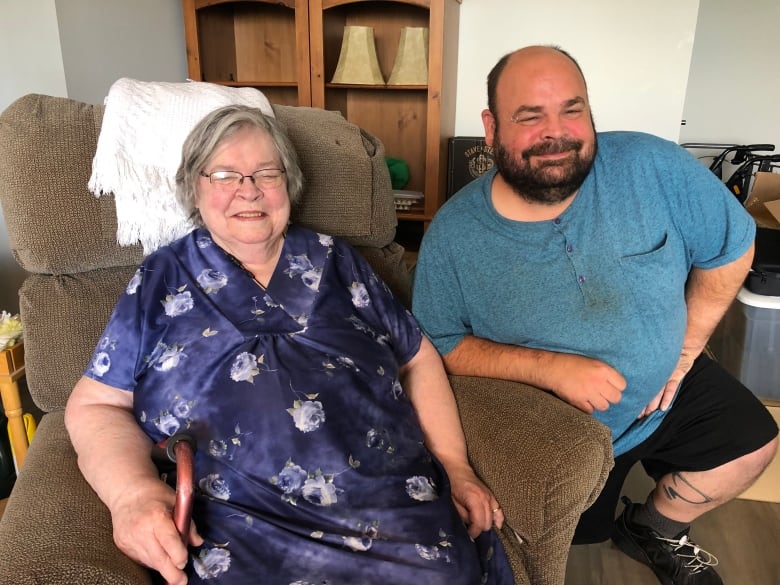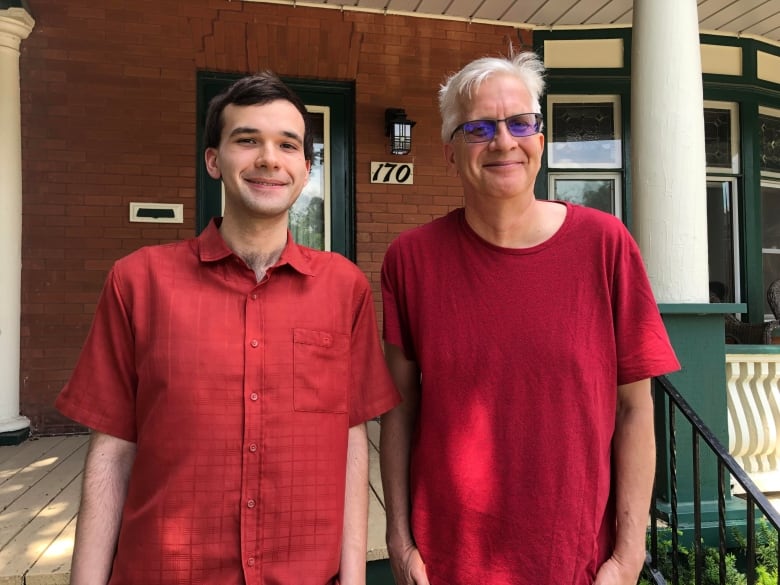
Peggy Ryan first moved back in with her mom 10 years ago as a last resort.
She had lost her job and it was getting harder to keep up with all the bills.
Moving back into her childhood home just made most sense at the time. Ryan, 36, planned to save on rent and food and move out when she found work again. But as the years passed on, she realized living with her mom made most sense in the long term too.
“This is where I grew up. This is where we lived with my grandparents,” Ryan said. “I really can’t see living anywhere else.”
Living together costs the Ryans $5,000 a month for everything they need, including hydro, home and life insurance, groceries and the mortgage.

She said if she were to live alone, she would likely be spending more than half of that on just rent.
And based on national data — Ryan likely isn’t alone in feeling that way.
Living with your parents as a last option
Multigenerational living is pretty common across many cultures — but there’s a growing number of Canadians moving back in with their parents as a last resort.
According to the most recent data from Statistics Canada, in 2021, 35.1 per cent of Canadian young adults under the age of 34 live with at least one of their parents.
The agency found the percentage of adult kids living with their parents has jumped by about five per cent across the country from 2001 to 2021.
Why pay double for everything? Heat, hydro, utilities, food. So we moved in together and we just worked together.– Paul Dietrich, a Waterloo resident who lives with his mom
One of those people is the mayor of Wilmot, Ont., Natasha Salonen.
She made headlines for saying she can’t afford to buy a house in Waterloo region, where she lives — despite making about $90,000 a year.

She told me she’s hoping the money she saves will help her eventually pay back her student debt and save for a down payment.
Salonen said there is a need for systemic change.
“I am actually setting up a national housing sprint,” she said.
Salonen said her housing sprint is inspired by The Oxford Housing Sprint, which is focused on getting industry, academic and policy writers in the same room to help politicians get a larger-picture view of the housing crisis before writing new policies.
“It’s going to be coming together and talking about what our concrete policies in a comprehensive plan together that the federal government, provincial governments and municipalities can do to create actual change so that people in my situation are able to have a home one day if they so choose,” Salonen explained.
She said meanwhile there are some philosophical questions we need to ask ourselves about multigenerational living going forward.
“My grandfather, when his family moved from Italy as immigrants, multigenerational living was how most immigrants were living and then later able to build enough equity to go out and buy homes for all of themselves,” she said.
“So is that something that we need to be looking at?”
Caring for sick parents
Salonen’s dad has ALS. Moving back to her childhood home allows her to take better care of him.
It’s something Paul Dietrich can relate to.
He’s a 42-year-old man who moved back in with his mom primarily to take care of her and save money.
After she became sick, his mom, Gloria, was unable to regularly climb up and down the stairs, so she had to sell the family home Dietrich grew up in.
Last month, they moved in together to a new condo they’re renting for $2,350 per month.
“Why pay double for everything? Heat, hydro, utilities, food. So we moved in together and we just worked together,” he said.
“Then as the years went on, her health started to get worse and I would do more and get her to stay at home and … I wanted to be there for her. It turned out within a few years it was better financially, because there’s no way we could have afforded separate places.”

He said they’re on a really tight budget because the high cost of rent doesn’t leave much for other necessities like food, cellphones and an Internet connection.
There are also his mom’s growing medical bills that he has to plan for.
So just like Peggy Ryan, he won’t — and can’t — move out any time soon.
Saving for a down payment
Mark Wittich is a 26-year-old with dreams of saving up and buying his own house.
He never moved out of his parents’ house even after graduating from university — hoping it would give him a better chance of one day making it on his own.
“It’s still tentative, but I’m kind of looking at moving out west in the next year or so. I’m looking to move into Alberta,” he said.
“There’s possibly remote work opportunities there as well with my current employer. I’d say probably within the next year max … [I will have] moved out and be living on my own.”

‘Alberta is calling’
Mark is not alone in his plans to move to Alberta.
The province has been capitalizing on Ontario’s affordability crisis.
Alberta attracted more inter-provincial migrants than anywhere else in Canada in the first three months of 2023.
The latest phase of the Alberta is Calling campaign ran from March 13 to April 9 and focused on attracting workers from southern Ontario and Atlantic Canada.
On the campaign’s website, it says the cost of a new home in Alberta is half of what you’d pay in Ontario, promising that you’ll also make more money, your taxes will go down and you’ll have more disposable income.
Rent is a lot cheaper outside of Ontario as well.
According to the most recent Rental Market Report by the Canada Mortgage and Housing Corporation (CMHC), rent for two bedroom apartments has increased by over 25 per cent in Waterloo region.
To compare, rent for two-bedroom condos only went up by about 1.6 per cent in the same year in Edmonton.
Give me shelter: The hunt for housing in Waterloo region is a series by CBC Kitchener-Waterloo that hears from the people struggling to secure the housing they want and need. They might be making do with non-traditional housing: a tent, a room shared with multiple people or their parents’ basement. We look at how the basic need for housing is not being met for many people in a rapidly-growing region of Ontario.
